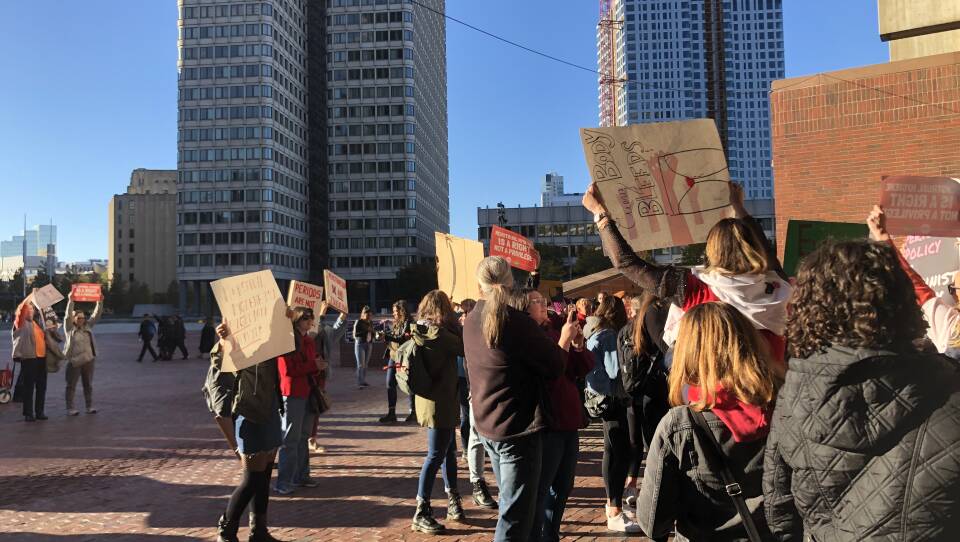Carrying signs like “Periods are not a luxury,” some dressed in scarlet and crimson, a group of activists gathered on Saturday afternoon in front of Boston City Hall to push for accessibility to menstrual products.
Boston’s gathering was one of more than 50 rallies scheduled across the United States this weekend for what is being touted as the first-ever National Period Day, meant to tackle the often taboo topic of menstruation and to advocate for better access to period products for low-income women.
“People don't understand the cycle of poverty and how that is linked to lack of access to menstrual products,” said Linzy Rosen, a 19-year-old Brandeis University student and rally organizer. “If you don't have access to menstrual products then you'll miss school, you'll miss work and that will inevitably affect your entire life.”
The event was launched by the nonprofit PERIOD, an organization founded five years ago by two 16-year-olds in Portland, Oregon. Co-founder Nadya Okamoto, now a 21-year-old living in Massachusetts, said she created the organization in high school while she was experiencing homelessness and saw first-hand the challenges homeless women face while managing their menstrual cycle.
The nonprofit has now grown to more than 400 chapters in at least 30 countries. Saturday’s event was fueled by supporters from school and community chapters eager to bring a national spotlight to what they are calling a youth-led “menstrual movement” to end stigma and support free access to products like tampons and pads.
Okamoto, who attended a rally in front of the Capitol building in Washington, D.C. also on Saturday, said she initially envisioned a handful of rallies around the U.S. and a social media campaign — but the plan took off with events in every state. The hashtag #NationalPeriodDay was trending on Twitter, garnering support from lawmakers like Sen. Kamala Harris and Rep. Ilhan Omar.
“I honestly would never have imagined that we would be able to pull something off like this," Okamoto said in a phone interview with WGBH News on Thursday. “It just feels really unreal.”
The rallies are meant to raise awareness and push for policy changes. One focus is on eliminating the so-called "tampon tax," where about 34 states have a sales tax on period products, which considers them luxury items.
Massachusetts does not tax menstrual products. But supporters are pushing legislation to require access to free menstrual products in prisons, homeless shelters and public schools. Earlier this year, Sen. Patricia Jehlen, a Democrat from Somerville, filed the “I AM” bill, currently pending in the state Joint Committee on Public Health.
Sasha Goodfriend, president of the feminist organization Mass NOW, co-authored the bill with other members of the organization’s board. Mass NOW also partnered with PERIOD for the Boston rally. Goodfriend said she saw the occasion as a chance to talk about an issue rarely discussed in a public setting.
“The most common thing that I hear when having a conversation about this bill is, ‘I can't believe we didn't already talk about this,’” Goodfriend said. “That just speaks to the underrepresentation of menstruators in government and public policy that we really need to consider a crisis.”
Goodfriend also emphasized the importance of inclusivity and community in the conversation about menstrual equity. The “I AM” bill uses gender-inclusive language like “people who menstruate” to ensure that gender minorities, such as transgender and gender-nonbinary people, have the same access to menstrual products as those who identify as women.
“There is this power that comes with being able to tell your truth and be seen by people who believe you and that you're not alone,” Goodfriend said.
Five years after founding PERIOD, Okamoto said she’s more confident than ever in the power of the menstrual movement. Okamoto published her book, “Period Power: A Manifesto for the Menstrual Movement” during a leave of absence from her studies at Harvard University last year.
Next year includes a national collection drive for period products and a conference for chapter leaders and activists in the spring, she said.
“We've really proven that we can do this,” Okamoto said. “We have this big army of period warriors. We will take down the tampon tax.”
Kaya Williams is a journalism student at Boston University.




